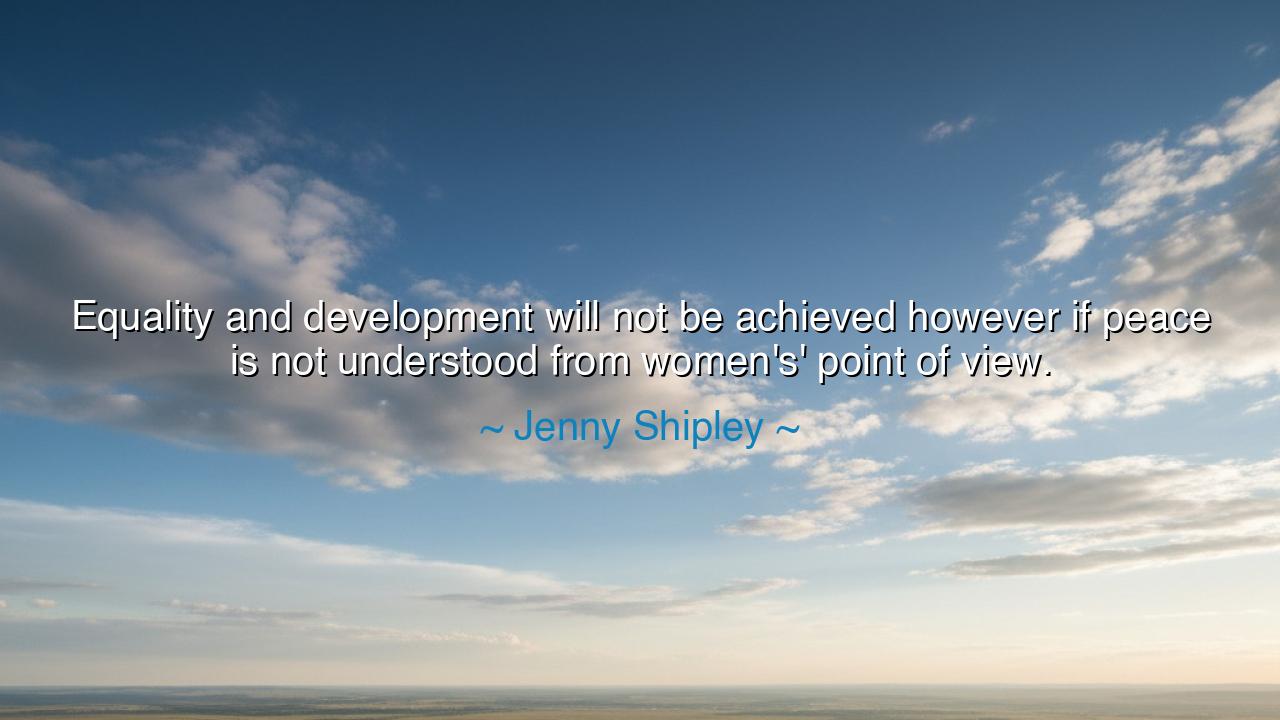
Equality and development will not be achieved however if peace is
Equality and development will not be achieved however if peace is not understood from women's' point of view.






“Equality and development will not be achieved however if peace is not understood from women’s point of view.” Thus declared Jenny Shipley, the first woman to serve as Prime Minister of New Zealand, a leader who carried both the weight of governance and the wisdom of experience. In her words lies a truth too often ignored: that peace, if seen only through the eyes of men, is incomplete. For true equality and enduring development can only arise when the voices of women—keepers of homes, bearers of children, healers of wounds, and leaders in their own right—are heard and woven into the fabric of nations.
The ancients themselves hinted at this wisdom. In Greek myth, the war goddess Athena was not only the patron of battle but also of wisdom and justice. In her figure we see the truth that peace is not merely the absence of war, but the presence of harmony and fairness. Shipley’s words remind us that women, too, hold a distinct vision of what peace means—not conquest, not dominance, but security, dignity, and well-being for families and communities. Without this vision, peace becomes shallow, a truce between armies rather than a healing of societies.
Consider the story of Liberia in the early 2000s. After years of brutal civil war, it was not generals nor politicians alone who brought peace, but the relentless work of women—mothers, sisters, and daughters—who gathered in protest, prayed in unison, and demanded an end to violence. Under the leadership of Leymah Gbowee, they pressured warlords and negotiators until a ceasefire was reached. Their efforts paved the way for the election of Ellen Johnson Sirleaf, Africa’s first elected female head of state. Here Shipley’s truth is made flesh: peace defined and demanded by women created the conditions for both equality and development to blossom.
Shipley’s words also reveal a critique of history. Too often, when peace treaties are written, women are absent from the table. Decisions about borders, armies, and treaties are made by men, while the concerns of women—safety from sexual violence, education for children, food security, healthcare—are brushed aside as secondary. But these are not secondary concerns; they are the foundations upon which life itself rests. To ignore them is to build peace upon sand, a fragile illusion that crumbles at the first storm.
Yet her statement is not only a lament but also a call to action. To understand peace from women’s point of view is to recognize that peace is not finished when the guns fall silent. It is complete only when families can thrive, when opportunities are shared, when both men and women live without fear. Only then does development truly take root, for no economy, no society, can flourish when half its people remain unheard.
The lesson for us, then, is clear: if we desire lasting equality and sustainable development, we must listen to the wisdom of women. Not as an act of charity, but as an act of survival. For women see dimensions of peace that men, bound by different roles and expectations, may overlook. Their experiences of care, of vulnerability, of resilience, reveal what peace truly demands. Without these insights, the world repeats its mistakes, mistaking temporary calm for true harmony.
Practical wisdom follows: in your community, your workplace, your nation, insist that women’s voices be present when decisions are made about conflict and about growth. Support women leaders, listen to the women in your family, honor their vision of what safety, stability, and justice mean. In small circles or great assemblies, make space for their perspective. For by doing so, you not only uplift women, you secure the very foundations of peace itself.
Thus Jenny Shipley’s words, though spoken in our modern age, carry the resonance of eternal wisdom. Peace, equality, and development are not separate quests but a single path, and that path cannot be walked with only half of humanity’s vision. Let us, then, heed her call: to see peace through women’s eyes, to build it with women’s hands, and to honor it with women’s voices. Only then will the world know a harmony that endures.






AAdministratorAdministrator
Welcome, honored guests. Please leave a comment, we will respond soon